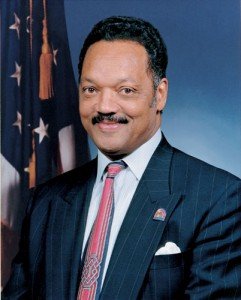To Choose Not to Vote Is to Surrender Self-determination
Jesse Jackson | 11/10/2017, 7:20 a.m.
Today is an election day in many parts of America. There are key gubernatorial races in Virginia and New Jersey. A single special election in a suburban Seattle district could win Democrats control of the Washington Senate and thus control of the entire state government. Charlotte, N.C., could elect the first black female mayor ever. A record 43 women are vying for seats in the Virginia House of Delegates. Voters in Maine will decide whether to extend Medicaid under the Affordable Care Act.
All eligible Americans should take the time to vote. The right to vote is the foundation of our republic. It is also -- and has always been -- contested territory. Originally, voting was restricted to white, male property owners. Against fierce resistance, citizen movements forced it to be extended -- to all white males, to women, to African-Americans at the ash end of segregation, to young people.
The right to vote was a centerpiece of the civil rights movement here, of the movement against apartheid in South Africa. Medgar Evers, Dr. Martin Luther King and Nelson Mandela understood: The right to vote is not just a mark of equal citizenship; it is central to self-determination. Enforcing the right to vote would bring an end to apartheid in the U.S. and in South Africa.
Voting is still contested territory today. Across the country, right-wing Republicans have pushed to make voting more difficult for the poor, the young, workers and minorities. They seek to make registration harder, to require various forms of ID, to cut the days and hours for voting, to purge voter lists, to close down the number of polling booths and more. These measures had dramatic effect in many states in 2016, including in Wisconsin, and arguably may have cost Hillary Clinton the election.
Every vote counts. Surely the 2016 election made that clear: 77,000 votes in three states made the difference in the Electoral College. Everyone talks about the voters who went from Obama to Trump, but a far larger number of Obama voters simply ended up not voting.
Too many still choose not to vote, especially in so-called off-year elections, when the presidency is not at stake. The fall-off is particularly extreme in the core of the progressive base: single women, millennials and people of color. By choosing not to vote, they forfeit the power that was won only after the sacrifice and struggle of many.
To go from being denied the right to vote to choosing not to vote is to surrender. It aids and abets those conspiring to suppress the vote. It insures that your voice is muted, while others gain more volume. To fail to vote is essentially to support the side of Trump, of George Wallace, of the Koch brothers, who know they can win only when large numbers of people stay home.
Young people of the so-called millennial generation have more eligible voters than any other. They have every reason to vote. Vote to make college affordable and gain relief from crippling student debts. Vote for affordable health care. Vote for the right to a job. Vote for livable wages. Vote for action against catastrophic climate change that, unchecked, will make your world less habitable. Vote so the concerns of young people cannot be ignored.
Some argue that an election doesn't offer a clear choice, that neither candidate champions the causes or the agenda that would inspire them. In Virginia, for example, the Democratic candidate for governor, Ralph Northam, is a decent, uninspiring, moderate establishment figure. He's run a cautious, defensive campaign almost designed to reduce turnout. His opponent, Republican Ed Gillespie, has run a vile and divisive campaign drawn straight from the playbook of Donald Trump and George Wallace: braying and lying about immigrants, gangs, Confederate statutes and more. Northam may not inspire, but a Gillespie victory would insure that cesspool politics spreads across the country in 2018. Virginians who choose not to vote today surrender to those who will drive us apart.
Sometimes the choices are narrow, but life can be in those cracks. If single women, young people and minorities vote in large numbers, the candidates they elect may not champion their entire agenda. But they -- and future candidates -- will pay more attention.
By voting, we gain power. By choosing not to vote, we surrender it. We cannot afford to do less than our best. We cannot create the society we want if we surrender our power to choose. Vote today and make certain your neighbor, your roommate, your coworker has voted. It makes a difference.
You can write to the Rev. Jesse Jackson in care of this newspaper or by email at jjackson@rainbowpush.org. Follow him on Twitter @RevJJackson.
Share this story online at stylemagazine.com




